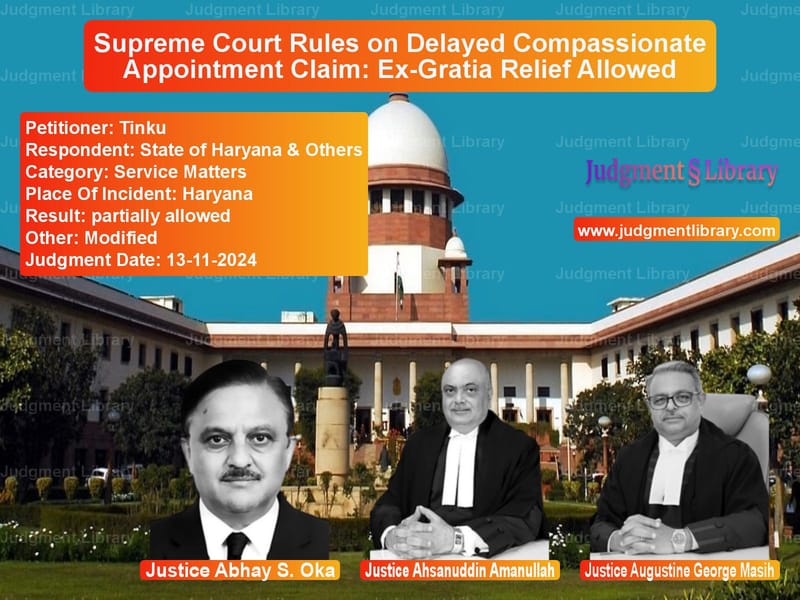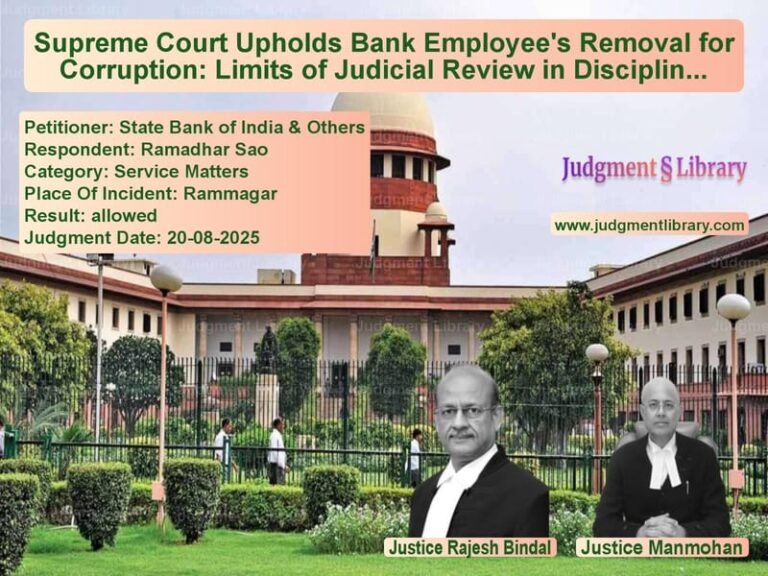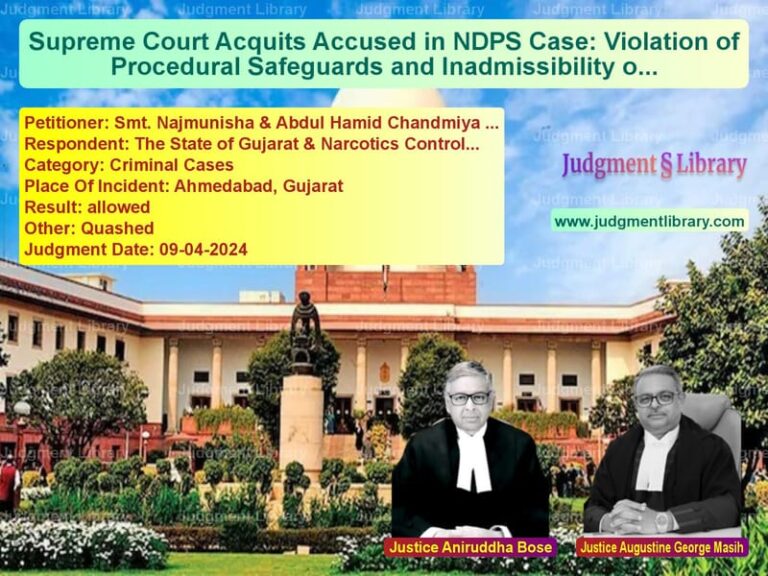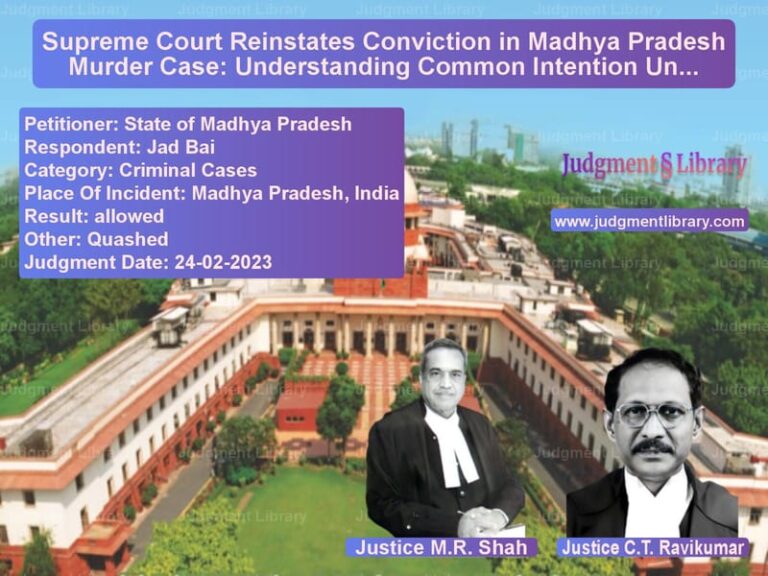Supreme Court Rules on Delayed Compassionate Appointment Claim: Ex-Gratia Relief Allowed
The Supreme Court of India recently delivered a significant judgment in the case of Tinku v. State of Haryana & Others, addressing a long-pending claim for compassionate appointment. The appellant, son of a deceased constable, sought a government job based on Haryana’s ex-gratia policy. The Court ruled against the claim for appointment but allowed the appellant’s mother to apply for ex-gratia compensation.
Background of the Case
The case revolved around a claim made by the appellant, Tinku, whose father, Constable Jai Prakash, died in service in 1997. At the time of his father’s death, Tinku was a minor, just seven years old. The Haryana government’s policy at the time permitted ex-gratia appointments for dependents of deceased government employees.
Read also: https://judgmentlibrary.com/supreme-court-rules-against-changing-recruitment-rules-midway/
The Superintendent of Police, Rohtak, recorded Tinku’s name in the Minor’s Register No. 47, reserving his right to claim a job upon reaching adulthood. In 2008, when Tinku turned 18, his mother submitted a request for his appointment. However, the Haryana Police rejected the claim in 2009, citing a new policy that imposed a three-year time limit for dependents to apply for employment after the government employee’s death.
The appellant challenged this decision in the High Court, arguing that the government had assured his employment by recording his name in the register. The High Court dismissed his petition, stating that no vested right existed for compassionate appointment. Tinku then appealed to the Supreme Court.
Supreme Court’s Observations
The Supreme Court made several critical observations on the issue:
- Compassionate appointments are an exception to standard recruitment rules and are only granted to provide immediate financial relief to families of deceased employees.
- The government has the authority to revise policies governing such appointments, and dependents cannot claim an automatic right to employment.
- The 1999 Haryana policy introduced a three-year time limit for dependents to apply for jobs, making Tinku’s claim legally untenable.
- While past appointments may have been granted under previous policies, that does not create a legal precedent for similar claims.
The Court stated:
“Compassionate appointment is not a vested right but a privilege extended by the State to assist families in distress. If the family has survived for over a decade without assistance, the need for a job under this scheme is diminished.”
Read also: https://judgmentlibrary.com/reinstatement-of-uppcl-technicians-supreme-court-overturns-termination/
Key Arguments by the Parties
Petitioner’s Arguments (Tinku):
- The Haryana Police had assured a job by recording his name in the Minor’s Register.
- His mother was unaware of her right to apply earlier, as she was illiterate.
- Other similarly placed individuals were granted jobs despite delays, and he should not be treated differently.
- Denial of employment violated his right to equality under Article 14 of the Constitution.
Respondent’s Arguments (State of Haryana):
- The 1999 policy set a three-year limit for such claims, rendering Tinku’s application invalid.
- The registration of his name in the Minor’s Register was an administrative step and not a job guarantee.
- Compassionate appointments must be given promptly to serve their intended purpose.
- There was no legal right to demand employment based on past discretionary appointments.
Supreme Court’s Final Judgment
The Supreme Court ruled:
- The claim for compassionate appointment was not legally tenable due to the three-year limit imposed by the 1999 policy.
- Appointments in similar cases before 1999 do not set a legal precedent for claims under new rules.
- The appellant’s mother, however, was eligible to apply for ex-gratia compensation under the 2006 Haryana policy.
- The State of Haryana was directed to consider her application within six weeks and release the compensation without interest if paid on time.
The Court stated:
“While employment under compassionate grounds cannot be granted after an extended delay, the government should not deny ex-gratia benefits to dependents left in financial distress.”
Impact and Significance
This judgment reinforces the principle that compassionate appointments must be granted within the policy’s prescribed time frame and are not an entitlement. Key takeaways include:
- Governments can set time limits for compassionate appointment claims.
- The recording of a minor’s name in official registers does not create an enforceable right.
- Families of deceased employees can seek ex-gratia compensation even if they miss deadlines for employment claims.
- Judicial intervention is limited when policies clearly define eligibility and deadlines.
Conclusion
The Supreme Court’s ruling in Tinku v. State of Haryana clarifies the limits of compassionate employment policies. While acknowledging the appellant’s hardship, the Court upheld the State’s right to impose reasonable restrictions on such appointments. The decision strikes a balance between ensuring financial aid to bereaved families and preventing the misuse of compassionate appointment schemes. It also highlights the importance of timely applications and the necessity of clear policy implementation to avoid legal disputes.
Petitioner Name: Tinku.Respondent Name: State of Haryana & Others.Judgment By: Justice Abhay S. Oka, Justice Ahsanuddin Amanullah, Justice Augustine George Masih.Place Of Incident: Haryana.Judgment Date: 13-11-2024.
Don’t miss out on the full details! Download the complete judgment in PDF format below and gain valuable insights instantly!
Download Judgment: tinku-vs-state-of-haryana-&-o-supreme-court-of-india-judgment-dated-13-11-2024.pdf
Directly Download Judgment: Directly download this Judgment
See all petitions in Employment Disputes
See all petitions in Pension and Gratuity
See all petitions in Public Sector Employees
See all petitions in Recruitment Policies
See all petitions in Termination Cases
See all petitions in Judgment by Abhay S. Oka
See all petitions in Judgment by Ahsanuddin Amanullah
See all petitions in Judgment by Augustine George Masih
See all petitions in partially allowed
See all petitions in Modified
See all petitions in supreme court of India judgments November 2024
See all petitions in 2024 judgments
See all posts in Service Matters Category
See all allowed petitions in Service Matters Category
See all Dismissed petitions in Service Matters Category
See all partially allowed petitions in Service Matters Category







